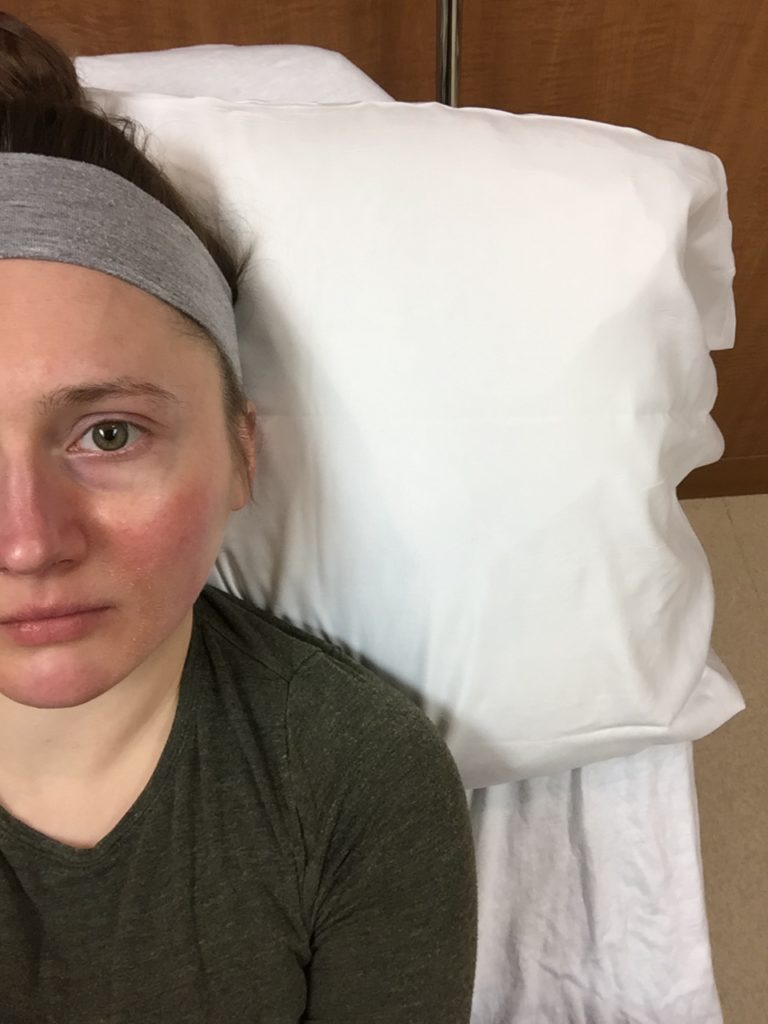The only way is through it. Breath after breath. Day after day. I told myself I would eventually get through the depths of pain. I remember in February of 2019 I was deep in a pain I never thought would go. I walked right into it, scared and uncertain, but confident in God.

I shuffled my way down the icy steps and focused intently to avoid slipping. Because slipping on ice was the last thing I needed right now. It was my “day 0 x-ray” of my colon. The day I have been dreading since November when my gastroenterologist recommend the Sitz marker test. I opened the car door and couldn’t even force a smile. My belly hurt badly and was already distended from not going to the bathroom for 7 days. For this test I had to stop all my motility and laxative medications I was placed on to keep my body functioning. I got into the clinic and rattled off my name and birthday to the x-ray technician. “Happy birthday” she said and smiled as she placed the radioactive pill full of 24 little rings into my palm. “Just swallow it and we can take the picture” she said. So I did just that and afterwards, got up to leave. “Do you want to see it?” she asked as she pointed to the screen? My attention was sparked, of course I wanted to see an x-ray of my intestine. I gazed at the image and my eyes scanned over all the dark areas. After 7 days of being instructed to eat, and take no medication, there was alot of food being packed into my intestine, without any movement out. My first thought after seeing the impacted intestine, “ouch”, no wonder why I feel so miserable. It was the first time I was actually seeing the reality of what I live each day.
I never thought on my 25th birthday, I would be driving to a test that was required to prove how constipated my body can really get. I was scared to really know the honest truth as to what my body could not do. Little did I know, that this test was the start of a diagnosis that eventually led me to get a surgery that would work. But at the time, all I could do was drive home and shrivel up in pain with my heating pads and wish for the test to be over. Honest truth. I wished it wasn’t my birthday and that I wasn’t 25 and battling such a debilitating disease.
After my colonoscopy in December that confirmed I had a redundant colon and lack of peristalsis in my colon, it was time to go into more in-depth testing. That is why my gastroenterologist recommended the Sitz marker test. I was just “done” with medical testing. I wanted to just live my life beyond the countless doctors appointments I had each week. But I logically thought about it and the last time I did comprehensive gastrointestinal testing was back in 2017 when I did the long radioactive test to diagnose small intestinal dysmotility. Thinking back, I know that deep down, my worst fear was finding that my digestive system is just paralyzed and there isn’t anything more that can be done for small intestinal dysmotility. But I played the “good patient” role and just let me doctor run any and all tests. Even if it was going to be painful, I agreed because I trusted him and I trusted God’s plan. And yes this Sitz Marker test was hard, but I am living to tell the story. Sometimes the scariest part is facing the truth.
The sitz marker test continued. Day 3, I had an x-ray and then again on day 5. I remember day 5 clearly, despite feeling like a walking tank of poop. My dad had to drive me, because I was in so much pain, I was hunched over and could barley move. It had been 2 weeks since my last bowel movement. The technician didn’t allow me to see the x-ray on day 3. I secretly hoped that I had the nicer technician from day 0 today, so I could see my scan. I was ready to see how impacted my colon really was.
Before I walked into my appointment, I looked at my dad and tears started rolling down my face. He knew I had been in pain these weeks, and today was no different. He listened as I told him what the options were if this test came back and there was no movement. I brought up the “worst case senecio” to see what he thought. “What if I need my colon taken out and I get a bag.. you know an ostomy bag.” He looked at me and said, it will be ok and honestly it will probably be more than ok.” His prediction was that I may actually get better with a surgery like that. His good friend got an ostomy bag and lived a completely normal life. The ostomy bag actually was a good addition.
I took his words of encouragement and tucked them in the front of my mind and walked into my last scan. I did get the nicer technician and she eagerly showed me my day 5 scan. She kept saying how sorry she was and pointed out the rings scattered throughout my colon. The food was just compacting as each meal was piled on the other. The rings piled in the colon were the proof of my new diagnosis of colonic inertia. Colonic Inertia is the technical term for a paralyzed colon.
If you look closely in my x ray below, you can see the majority of the rings are stuck in the ascending colon (the portion of the colon closest to the small intestine). Few made it to the transverse colon and a few trickled down into the descending colon. All 5 feet of my colon was paralyzed and the only thing pushing the rings through was the food, peristalsis wasn’t happening in my colon anymore.

7 years ago I started this blog. I was 18 years old and just starting to come to grips with this gutsy way of living. Unraveling your life to the world is a scary and vulnerable thing. At times, I wanted to avoid reality and pretend its all ok. My body was not ok and lying to myself only made the problem worse. So writing because a way to process life’s hard pains. Many of my pains were physical, but that did not mean I didn’t get sad or upset at what life was giving to me. This period in my life was a hard one to comes to grip with. I never thought my colon would actually stop working and become completely paralyzed. I never thought I would be the one on the surgery operating table getting colon surgery. Even 6 months later, writing this, I am struggling to finding the words because the pain runs so deep.

December 2018 I had to stop working at the clinic all together because my body was getting very sick. Not only was my colon paralyzed, but that constipation and line of meds was taking a more systematic toll. My liver had increasing levels of elevated enzymes, my thyroid was under functioning, my thinking was foggy and my body was retaining excessive amounts of fluid to buffer the toxic buildup inside my colon. After that sitz marker test in February, I was allowed to go back on the regimen of medications to move my bowels. But unfortunately my body did not respond, even with the highest doses of laxatives and combining them. I went the whole month of February not having a bowel movement. It was pure misery and my gastroenterologist was afraid of a colon blockage so he prescribed 3 gallons of colonoscopy prep and after 29 days, I finally slowly begin to empty my colon. I’m not going to sugar coat this, it was a time of complete misery. I passed out from the pain and electrolyte shock that week several times, and spent countless nights on the bathroom floor because I was in such pain.

March rolled in and I continued on that regime of 3 colonoscopy gallons a week. I was in such a fog, I barely could get out of the house. I would pick up a giant box each week at the pharmacy with my gallons of colonoscopy prep. It was embarrassing and I hated taking such powerful medications that flushed my body of essential electrolytes and bacteria, but I had no choice if I wanted to avoid a blockage. My nutrition was very limited and I was only tolerating small amounts of juices, purees or smoothies. I only could take about 5 weeks until my body started to reject the colonoscopy prep and I couldn’t keep it down anymore. Surgery was unavoidable now and clearly the next step if I wanted to live to overcome this. My gastroenterologist handed me a referral letter and the search for a colon and rectal surgeon began.
Searching for a colon and rectal surgeon was overwhelming! The specific surgeon my gastroenterologist referred me to had a waiting list until March 30th, and I knew I could not wait that long. So I called the local hospitals around Minneapolis, read reviews and called to see their wait list. When I asked, some surgeons wouldn’t even take on my case because they didn’t deal with patients who had colonic inertia. I narrowed it down to 2 good options and scheduled an appointment with each to get their opinions. I spent a few days getting all my records from all the ER visits from the past 2 years, my countless gastroenterologist appointment notes, Mayo Clinic records and all the x rays and CT’s of my colon. After that was all over, I patiently waited until my first surgeon appointment.
Dr. C was unfortunately not a good fit. I was super discouraged afterwards but still did the testing he required to get a more in depth picture of the function of each section of my colon. He ordered a MRI defecography at the University of Minnesota medical center, to test the functionality of my rectum and pelvic floor muscles. This would determine what surgery would be more suitable for me.


The MRI defecography was definitely not a test I would want to redo. It’s basically a test where they do a live MRI (with the technicians watching) as you poop out radioactive gel. In simple terms, they can determine what your rectum and pelvic floor muscles are doing when you poop. 1 week later I got the results and went over them with Dr. C. He was very unspecific with his reasoning (which made me uneasy and questioned his experience with colonic inertia cases). He didn’t like the way my pelvic floor dropped or “prolapsed” due to weak muscle tone, so he said he would not do colon surgery without first doing pelvic floor surgery with a mesh.
I got home that night and posted on the colonic inertia facebook group (I learned alot from this group and it was a great support from patients all over the world with this same condition. I highly recommend it, if you have colonic inertia). I was alerted from members that pelvic floor dysfunction function is common with people who have colonic inertia, due to the constant strain they put on those muscles with severe constipation. The specific condition I had was a pelvic floor prolapse and rectocele. The next day, I scheduled with a gynecologist in the same clinic as my family practice doctor. I wanted his opinion about this pelvic floor prolapse and if he thought the risk of having pelvic floor surgery was worth it. It’s risky given my young age and the fact that scar tissue could be a complication in planning a future family and pregnancy. He reassured me after looking at the scans that my prolapse was due to the strain/pushing of chronic constipation and it looked similar to a woman’s pelvis after pushing from a hard childbirth. He said I should get another colorectal surgeon’s opinion and in the meantime do pelvic floor therapy to retrain those muscles without needing surgery. I’m so thankful I got his opinion and went with my gut instinct to not go back to dr. C.

Another week went by and by this time, I was headed to the second surgeon’s appointment I had scheduled. Monday morning, Dr. B. greeted my parents and I, and we sat down to evaluate and look over all my medical records and history. I had my health history easily memorized and rattled it off to my surgeon and my parents nodded in agreement.
Then there was a point where he stopped me and asked how this condition is affecting my life. I stopped silent. Usually I am very composed at appointments, despite the pain I am in. But this time was different. Tears streamed down my face and I admitted how I can barley go anywhere or participate in activities due to the pain in my stomach. I have no energy, because everything I eat just sits inside. He looks at me with compassion and my mom grabs my hand because she notices how tightly I was gripping my chair. The fear of the unknown, but mostly the fear of having no end to my suffering was surfacing. Dr. B saw it too.

He redirected my attention to the first scan he had pulled up. My eyes lit up as he pulled up each scan from over the past 3 years. I could tell, this wasn’t his first time looking at them, and I was impressed he reviewed them before my appointment today. He pointed out that yes indeed the colon was very slow or paralyzed. He agreed, my pelvic floor could use pelvic floor therapy to see how it responds before deciding between an ileostomy or the Ileorectal anastomosis (IRA) surgery. He didn’t miss anything and asked questions that no other doctor had asked before. The fact that he was more than willing to take me on as a patient, given that my case is complicated, gave me hope that he would be the one to help me. He would help me get clear answers and hopefully relief.
He went over the possibility of having the diagnosis of whole digestive motility problems. In this case, surgery on the colon would not be advised because if the small intestine is slow, then it would not help to do colon surgery. Small intestine motility unfortunately has no treatment (which I already knew). Given that my previous diagnosis was small intestine dysmotility, there was a chance that my small intestine and colon were both paralyzed. But Dr. B told me that he wanted to recheck to see if this was misdiagnosed based on improper testing. He made the decision to redo the work Mayo had done and redo a small intestine transit test. But this time, the right test, because the radioactive transit test I did 3 years ago was a research test and it didn’t have good references ranges.
He ordered whats called a small bowel follow through, which is more commonly used all over the world. I was instructed how to prepare for the x rays, so that when the small bowel follow through was done, the results would be based on just my small intestine transit time (without interference with the colon causing everything to back up). This initial surgical consult appointment ended up being almost 2 hours long and I had confidence that God had led me here. This was an answer to my prayers and I had a feeling that everything was going to work out.
I had my plan in place. First: prepare for the small bowel follow through test, take the test, and await the results. Second: redo the anorectal manometry test and based on those results, do pelvic floor biofeedback sessions. I scheduled the test later that week and prayed to God to please let Dr. B be right and Mayo Clinic be wrong with their diagnosis. I so badly wanted to be properly diagnosed and would honestly rather have a disease that had a solution, instead of one that simply didn’t. I couldn’t go on living this way.



During the test I felt nauseous and sick to my stomach after I drank the radioactive liquid. I waited 20 min and redid an x ray, then another 20 min, then another 20 min. Suddenly the nurse came in and started to help me out of the x-ray gown. I was shocked and asked “what’s wrong?”. She said nothing is wrong, but that I’m done. My small intestine was normal at emptying after 55 min. I knew exactly that this meant Dr. B was right. Mayo clinic had misdiagnosed me with small intestine dysmotility, and now its clear I have just colonic inertia. Surgery was finally a viable option and hope was in my future! (I never in my wildest dreams would have thought I would be excited about colon surgery, but after what I have been through for years, I wanted it).
Next up was the anorectal manometry. Based on the name, you can probably guess, this one wasn’t comfortable. It was to measure the pressure and make sure my muscles are coordinated with pushing, relaxing and defecation (pooping). The results came back, showing that my muscles were paradoxic (reversed) and I was instructed to start biofeedback as soon as possible.


I went for 3 weeks to the pelvic floor therapy center for biofeedback. Biofeedback is basically retraining your body how to function properly. It uses sensors and a screen to visually show you what your muscles are doing and how you can control them. After the 3rd session, my therapist told me that I was a quick learner! My rectal muscles were working very well and I had properly and successfully learned how to have normal pelvic muscle movements. She commented how once in a while, she gets patients like me, who simply just need colon surgery to get well. She handed me the discharge papers and sent me back to my surgeon.
I got a call the week later that Dr. B had those results and wanted to see me for a recheck. The scheduler lady was shocked to find he had a cancellation for the next day. This was simply a miracle because his schedule was booked out 1 month into May. My body was worn down and very sick. I could barley get out of bed to make it to my 9am appointment, but somehow I did. I went alone this time. Dr. B walked in and asked if my parents were coming to this appointment. I told him no, because I thought this was going to be a quick recheck and that I was just going to need more tests. “Ok, let’s check to see how you are first.” He did an exam of my belly. Being only 5’1” my stomach has no room to extend when its compacted, so its very visible when I’m constipated. He pressed around lightly on my extended belly and the pain was so bad, I had tear drops running from my eyes. I hide my pain well, but he saw right through it.

“Lets make a plan” he said. “What do you think about loop ileostomy?” My heart jumped, this is it, we are scheduling my surgery! I said “yes please, lets do it!” He smiled and nodded. Dr. B explained that even though my small intestine and pelvic floor work, doing a loop ileostomy is much less invasive than doing a full colon colectomy (removing all 5 feet of the colon). The loop ileostomy is a last test in itself to see if by bypassing my colon, my body can eliminate successfully. If the loop ileostomy works, then in 12 months I can get the colon removed and the ileorectal anastomosis surgery (reattaching the small intestine to the last inches of rectum muscle, so no stony bag). Or I could simply choose an end ileostomy which is keeping the stoma/ostomy bag but taking out the unneeded colon (colectomy). It was my choice and we would revisit these ideas after I recover fully from this first surgery.
I fully trusted his plan and we marked my surgery date in his book May 13. This just so happens to be the feast day of Our Lady of Fatima too! I was to see him and the stoma nurse the week before surgery to get my stoma incisions marked and to go over my plan for surgery prep (a.k.a. getting my colon as clean as possible). As I left, I couldn’t stop smiling, knowing that I am being given this chance. My days of painful medical testing are over, we have a clear answer and a solution. I have been waiting for this day for as long as I can remember. A chance to remove a diseased part of my body and finally be healthy and be given new life. God is blessing me with this second chance.






















Thank you so much for sharing your journey. I have been following your life story for years & am always inspired & amazed & encouraged by your courage, honesty & love moving forward.
I will definitely keep you in my prayers that your life may progress with ease & grace.
Thank you Skye, your prayers do mean a lot!!
You’ve been through a lot, Caroline! But you’ve gotten through it. They say our greatest difficulties make us stronger if we don’t let them beat us. I’m so happy you have a supportive family and a good doctor. And I’m rooting for you, Caroline!
Susan, thank you! I believe that too and continue to remind myself that with any daily setbacks. I have another surgery coming up to finalize it, but I know I can power through with Gods help!
Thanks for your update, Caroline.
I hope the surgery went well and that you’re finally finding relief.
I have been following your blog for years.
Ana from Spain
Ana, yes my surgery was great. It’s giving me my life back. I’ll be posting an update soon.
just wanted to say you are incredible.
incredible for showing up to life & living it.
seriously.
if anyone knows what it’s like to feel like you’re being weighed down by bricks in your intestines – i do.
i’m still trying to figure it out for myself & how to get through it cause, like you, it’s not a way to live.
but thank you for post. you are truly an inspiration and i really hope your surgery is helping you. God sure has planted a beautiful spirit in you and wow is your faith strong girl.
xo rachel
Aw thanks you Rachel! I am right there along with you. It’s not easy to live with colonic inertia, but don’t be afraid to be strong and courageous with what you are going through. You will get through it <3
Hi Caroline,
Just wanted to ask you a question/your opinion if you don’t mind answering.
You mentioned doing the longer GES at Mayo on your blog that lead them to tell you you the small intestine was the issue. But then did a different test that contradicted that, which was huge for moving forward w surgery. Just wondering if you have any understanding of why the initial Mayo test didn’t diagnose it correctly?
Hopkins does a similar long GES (full gut transit) and I just want to make sure I’m getting the right reading of it all so just wanted to ask your thoughts about it.
Many many thanks and good luck this week!!!
x Rachel
It was because my surgeon pointed out that that long GES has very small reference ranges for the amount of time the small intestine takes to empty, there isn’t enough research all over the world of data entered like there is with the small bowel bowel through which is more common. Also my surgeon knew I had a colon problem based on the sitz test and he took that into consideration. Mayo stopped the test after 48 hours and honestly I never pooped all the radioactive stuff out (they just measured it until it spread through my colon, but it never came out!), so they did not calculate the colon dysmotility like the sitz test did. I hope that makes sense!
Wow Caroline, I hadn’t read this until now. I am so happy you finally got out of the pain you were in. I understand some of it because I have IBS and unfortunately I am numb in my bladder, bowels and vagina from spine surgery. I know from my last GI’s paper work of my last colonoscopy she wrote redundant. I mentioned it to one of my GI’s and they didn’t make anything of it. I’m almost afraid to clink on your link to see what it really means. My newer GI never examines me. He has no idea how loose or tight my muscles are at my anus. I do go to the bathroom, but still. I can’t wait to read your Part 2. You are so brave Caroline.
I defiantly understand and will pray for you. Don’t be afraid, answers always give us a clear picture and that is something to look forward to. A lot of times pelvic floor therapy is successful..actually most of the time it is, I was told. So there is hope!